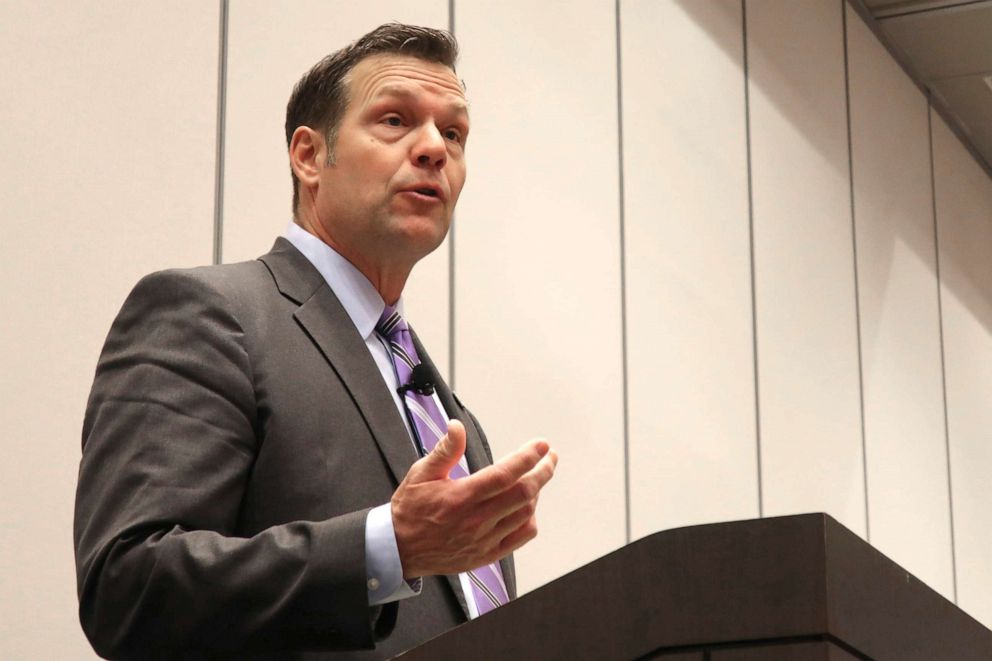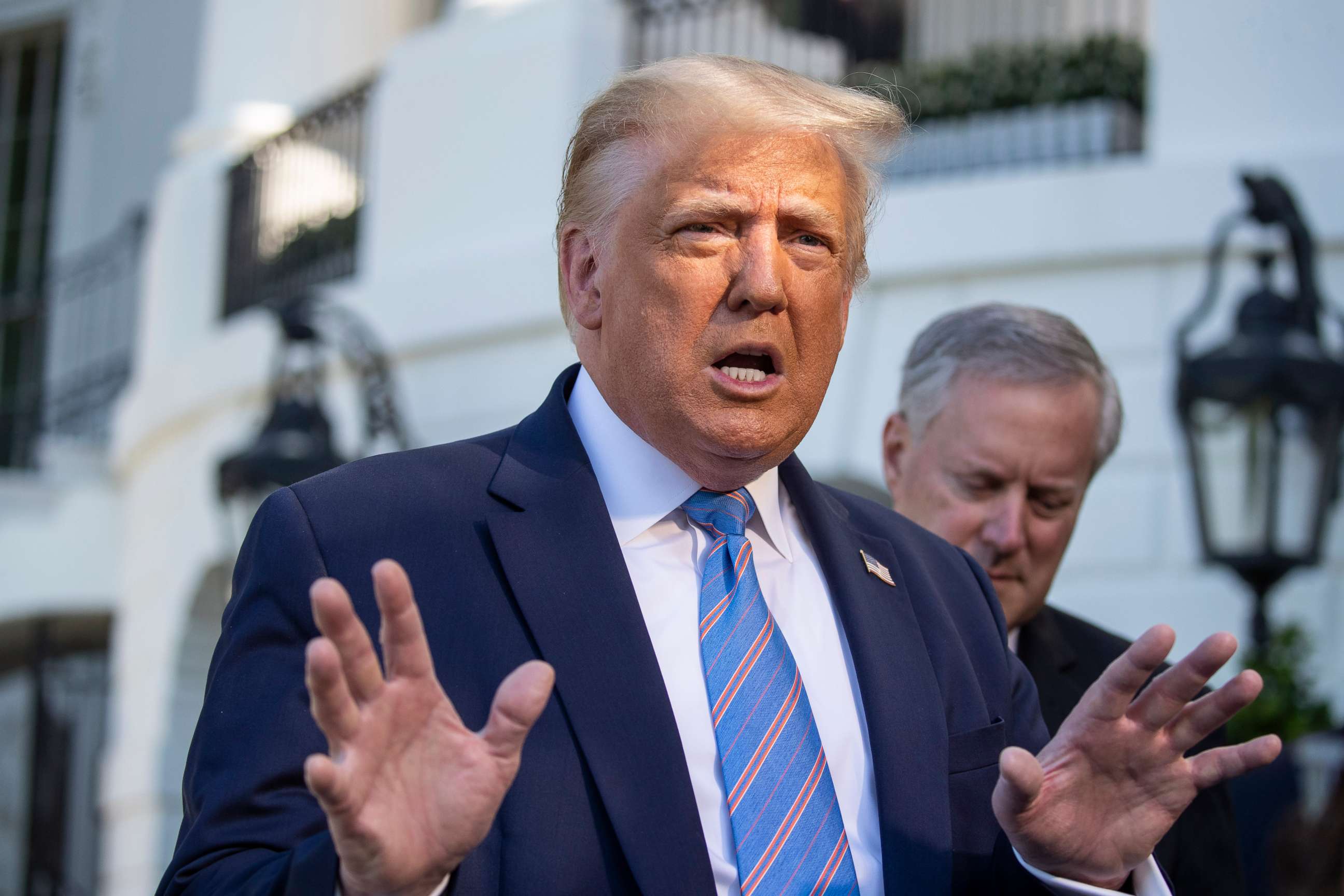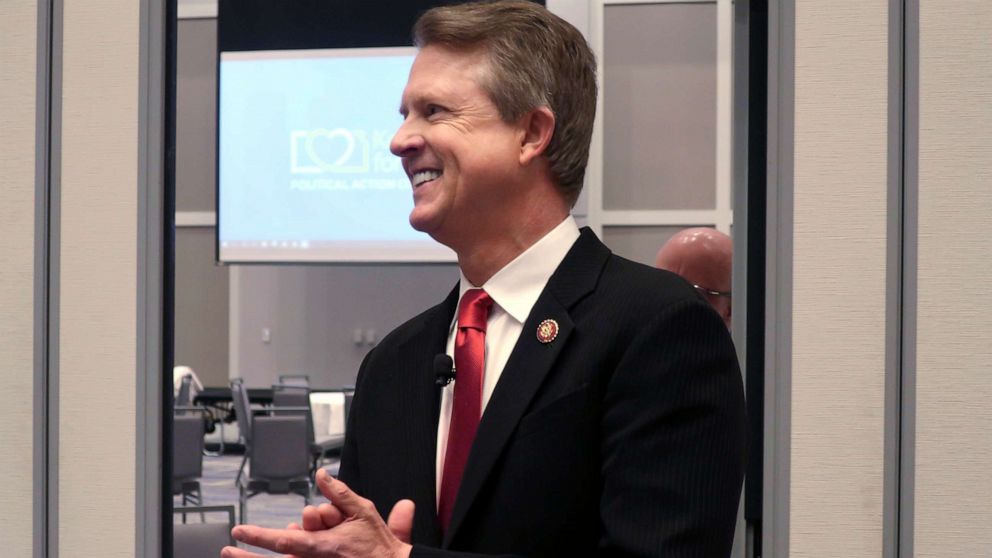Outside groups spend big on last days of Kansas Republican Senate primary amid intraparty duel
The final weeks of the Kansas Republican Senate primary have devolved into millions of dollars in spending from outside groups, negative mailers and both frontrunners, Rep. Roger Marshall, R-Ks., and former Kansas Secretary of State Kris Kobach, awaiting a possible endorsement from President Donald Trump.
Kobach -- a failed 2018 gubernatorial candidate -- is the nominee of choice for Democrats, who widely see their path to flipping the seat blue as a much easier one should Kobach win on Tuesday. No matter the nominee, Democrats will have a tough uphill battle in the state, which Trump won by 21 points in 2016.

Democrats have tapped physician and Republican-turned-Democrat Dr. Barbara Bollier as their Senate pick. Bollier, a former Kansas state senator, is leading the cash dash among the candidates and broke the state's fundraising records in the second quarter.
In the final weeks of the race, Marshall, who currently represents the state's first congressional district, fell victim to millions in outside spending from Democrat-aligned outside groups who spent big on television attacking him in an apparent attempt to weaken his presumptive lead. Bob Hamilton, a local plumber who is self-funding his campaign, has struggled to keep up his momentum as the primary grew increasingly competitive.
There's minimal public polling coming out of the primary -- which has the limited potential to turn the tables for Democrats who hope to regain the Senate come November -- but the consensus is clear: Kobach as the nominee could mean trouble for Republicans.
"When he ran for governor, he was the only Republican who ran statewide who lost," Nathaniel Birkhead, an associate professor of political science at Kansas State University in Manhattan, said of Kobach. "Everybody else down ballot won handily. He lost. The indicates there are a lot of people who voted for Laura Kelly and then voted Republican for the rest of the line."
Democrats have recognized Marshall's potential path to success through November and are spending heavily to try and boost their preferred candidate.
Sunflower State PAC, a Democrat-aligned outside group, has spent at least $3.5 million in ads attacking Marshall, whether it be for his history as a physician or for issues in his personal life. One ad called him "reckless and too risky for Kansas Republicans."
On the other side of the aisle, Senate Leadership Fund, the campaign arm of Senate Majority Leader Mitch McConnell, went on the air and spent more than $1 million in the Sunflower State in an effort to boost Marshall.
"National Democrats are spending millions to dictate the outcome in our Republican primary, lying about doctor and military veteran Roger Marshall," SLF's ad says.
Another ad, this one coming from Republican-aligned group Plains PAC, hits on Kobach's electability and points to his rocky history with voters in Kansas by saying, "National Democrats know a proven loser when they see one."
"Obviously Kris Kobach has probably the highest name recognition for anybody in the state of Kansas that's a current active politician. But he's also got a very unfavorable view among a lot of folks," said Birkhead.
After his tenure as secretary of state in the deep red state, Kobach launched his gubernatorial bid as a Republican, winning the primary by only hundreds of votes, but eventually losing the general election to Democrat Laura Kelly by five points.
Establishment Republicans have thrown their support behind Marshall, including retiring Sen. Pat Roberts, who Marshall, Kobach and Bollier, among others, are hoping to replace. Former U.S. presidential candidate Bob Dole, also a Republican from Kansas, endorsed Marshall, alongside the Kansas Farm Bureau, U.S. Chamber of Commerce and National Right to Life Committee.
Kobach, meanwhile, has endorsements from Gun Owners of America, the National Association for Gun Rights and the National Border Patrol Council.
Experts say that an endorsement from the president could make or break the race, but according to the New York Times, internal data showed that at least 30% of Republican voters would cast their ballot for Bollier should Kobach nab the nomination.

Inside the White House, Trump is opting to stay away from the primary and having to choose between Kobach -- who has spent his time on the trail touting his relationship with the president -- or Marshall, whose voting record closely aligns with his.
"Should he choose to give us the honor of an endorsement, it would absolutely seal the deal, not only the primary, but it would seal the deal that the seat stays red in November," Eric Pahls, Marshall's campaign manager, said in an interview. "Whereas, we all know if Kris Kobach gets the nomination, the chances of us keeping the seat red are slim to none."
Though Kobach sailed through his secretary of state elections in 2010 and 2014, he lost a Republican primary for state Senate in 2000 and the general for a seat in the U.S. House in 2004.
Kobach's team did not respond to ABC News' requests for comment.
Although the president had an easy path to winning Kansas in the general election, Texas Sen. Ted Cruz, who feuded with Trump during the Republican primary in 2016, swept the state in the 2016 caucus with a lead of nearly 20,000 votes, while Trump won handily in other deep-red states across the country. That points to Kansans' appetite for a moderate pick, Birkhead told ABC News.
"We can point to the primary elections that occurred in 2014, when several extreme Republicans were replaced by more moderate Republicans," he said.
That trend continued through the 2018 midterms, as well, where the state's third congressional district flipped from red to blue.
The two don't differ much when it comes to policy, Birkhead said. Voters in Kansas could expect Marshall and Kobach to vote extremely similarly in the Senate.
"Neither one is running away from Trump at all, they're both running very strongly towards Trump. They're just doing it in slightly different ways. The fact that Trump is not actually supporting one candidate or the other indicates that there's not a ton of difference there," Birkhead said.




